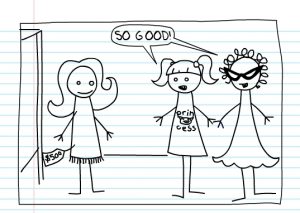A few things stand out clearly when I remember my senior year of high school: late nights, car-ride karaoke, Taco Bell runs, and my lunchtime ritual of watching Home Star Runner Flash-animated Internet cartoons.
Home Star Runner was one of the original Internet video cartoons. Every week, my friends and I gathered around our English classroom computer to watch the latest episode by Mike and Matt Chapman. With references to pop culture, video games, classic television, and music, it was entertaining and humorous to watch Strong Bad and his band of fellows provide commentary on the world. Recently, Home Star Runner started uploading their old videos to YouTube. It was a moment of joy to discover, but quickly mixed with the wrong kind of nostalgia and a sinking feeling in my stomach.
I watched their series “Teen Girl Squad” for the first time in years, and my heart sank.
The videos follow four stereotypes: Cheerleader (i.e., the popular and pretty one), So and So (fashionista), What’s Her Face (unpopular girl), and The Ugly One. The girls are described as being between the ages of 13 and 19. Each video is a short adventure, usually ending in disaster. Yet what caught me off guard wasn’t so much the disasters in story, but the disasters in character.
The first video features Cheerleader encouraging her friends to go “Look so good!” It is quickly revealed that So and So only cares about looking good, What’s Her Face has a crush on every guy, and The Ugly One is quickly kicked offscreen. Cheerleader is left, and Strong Bad encounters her, tells her she looks good, and invites her to go out for food. Subsequent videos focus on the girls’ continual search to “look good” and attract boys – from magazine tips to shopping ‘til they’re broke to vacations. They also hate having to go to school, except for when they get to study with boys. Even worse, the men continually look at the girls as objects to be dated.
Now, I can take a joke. These are short, satirical videos by two guys at the dawn of Internet culture. Yet I can’t help but wonder: How much did these videos contribute to male perceptions of girls? Given that nearly all of my male high school friends watched and laughed at these videos, I have to wonder further: Is this what they thought of girls? Is this the message that the Internet provided them during their formative years? And if it was, how much did videos – and other Internet mediums like this – contribute to current misogynistic culture in video games and the Internet?
What had begun as harmless teenager fun was now a moral dilemma of sorts. Looking back to my teenage years, I have to wonder, how much did I encourage this? Did my watching satirical material like this help perpetuate images that my male friends held of girls? And if it did, what could I have done differently?
“Teen Girl Squad” is a terrible Internet series. Even though it’s a joke, it’s a terrible one. One that perpetuates harmful stereotypes and fostered misogyny. My initial excitement at reliving youth has turned into a self-reflection on how my own actions may have contributed to misogyny, and how rather than relishing in old Internet videos and their stereotypes, we should instead be encouraging new forms of entertainment that foster positive images of girls and boys. There is still humor to be found in the world, but it doesn’t have to come at the price of a teenage girl’s dignity.
-Tiffany Rhoades
Program Developer
Girl Museum, Inc.

